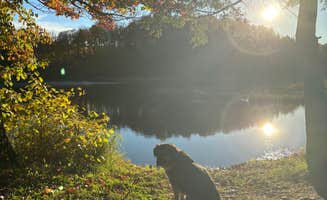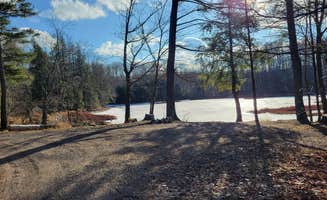Horn Lake Camping provides dispersed camping opportunities near Kennan, Wisconsin, situated in the Northern Highland region where the terrain features rolling hills, dense northern forests, and numerous small lakes. The area typically sees seasonal temperature variations with summer highs reaching 80°F and winter lows dropping well below freezing. Access roads can become challenging during spring thaw or after heavy rainfall, particularly in the final mile approaching the lake.
What to do
**Fishing access: **Horn Lake offers decent fishing opportunities for smaller watercraft. According to Charles N., "We camped here in May not much for skeeters, good sites on the lake with a fire pit on a dead end road with a boat landing."
Wildlife observation: The surrounding forest areas provide habitat for deer, various bird species, and occasional small mammals. The quiet, undeveloped setting creates natural wildlife viewing opportunities from camp, particularly during early morning and evening hours.
Seasonal exploration: Weather patterns significantly impact the camping experience. Jay S. notes, "A few mosquitoes, but the wind kept them to a minimum! Great view of the lake and very private."
What campers like
Affordability: The no-fee camping appeals to budget-conscious outdoor enthusiasts. Jarrett G. shares, "As a primitive camper who hates paying to sleep on the ground somewhere, this is my new favorite spot. Two sites, fire rings, no bathroom, water, electric."
Seclusion: Despite having two sites relatively close together, the remote location provides a sense of isolation. Campers report minimal crowding even during peak summer months, with weekday visits offering the most solitude.
Lake views: The lakefront positioning offers direct water views from both established campsites. Skip H. describes the setting as "a beautiful spot. Very quiet," highlighting the natural lake scenery as a primary draw for visitors.
What you should know
Road conditions: The access route requires careful navigation, particularly during wet conditions. "About 2 miles of dirt road to get there. Turn right when you get to ATV trail," advises Jay S., noting the specific turn needed to reach the main camping area.
Alternative sites: While the main area contains two established sites, additional potential camping locations exist but require greater caution. Skip H. warns about the left fork: "The road is tight and very twisty. There are numerous spots to camp, but no pits to the left."
Fire pit conditions: Some visitors have reported issues with the existing stone fire rings. Skip H. recommends: "I'd suggest using your own firepit/grill if you have one as some moron decided burning tires in the firepit was a good idea."
Tips for camping with families
Site selection: For families, the right-side camping area provides the most stable and accessible option. The established sites offer more level ground for tent placement and easier access to the lake for children.
Water safety: No designated swimming areas exist, so families should establish clear water boundaries for children. The boat launch area has a gradual entry point but lacks any safety features or supervision.
Insect preparation: Bug activity varies by season and weather conditions. Based on camper experiences, bringing appropriate insect repellent is essential, though some report, "A few mosquitoes, but the wind kept them to a minimum!" when conditions are favorable.
Tips from RVers
Size limitations: The access route and turning areas restrict larger recreational vehicles. Skip H. provides specific guidance: "Anyone up to 20' would be OK going to the right where the established 2 sites are."
Trailer considerations: Smaller trailers can navigate to the main camping area, but larger units should avoid attempting access. "I would not recommend going to the left unless the max your hauling is a teardrop," notes Skip H. regarding the more challenging sections of road.
Self-containment necessity: With no facilities available, RVers must be fully self-contained. The free camping near Kennan, Wisconsin requires bringing all necessary water, dealing with waste appropriately, and planning for complete off-grid operation during your stay.



